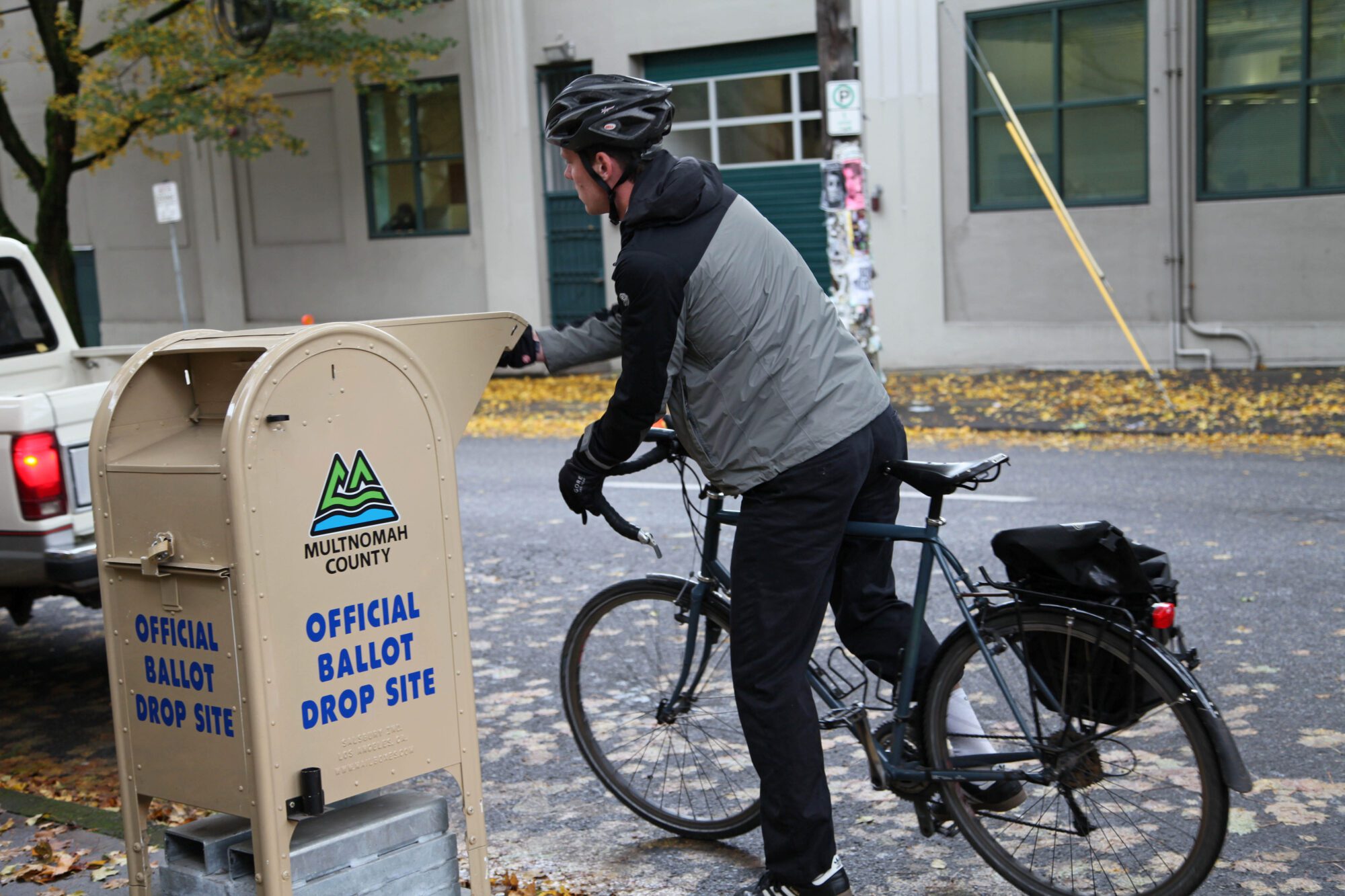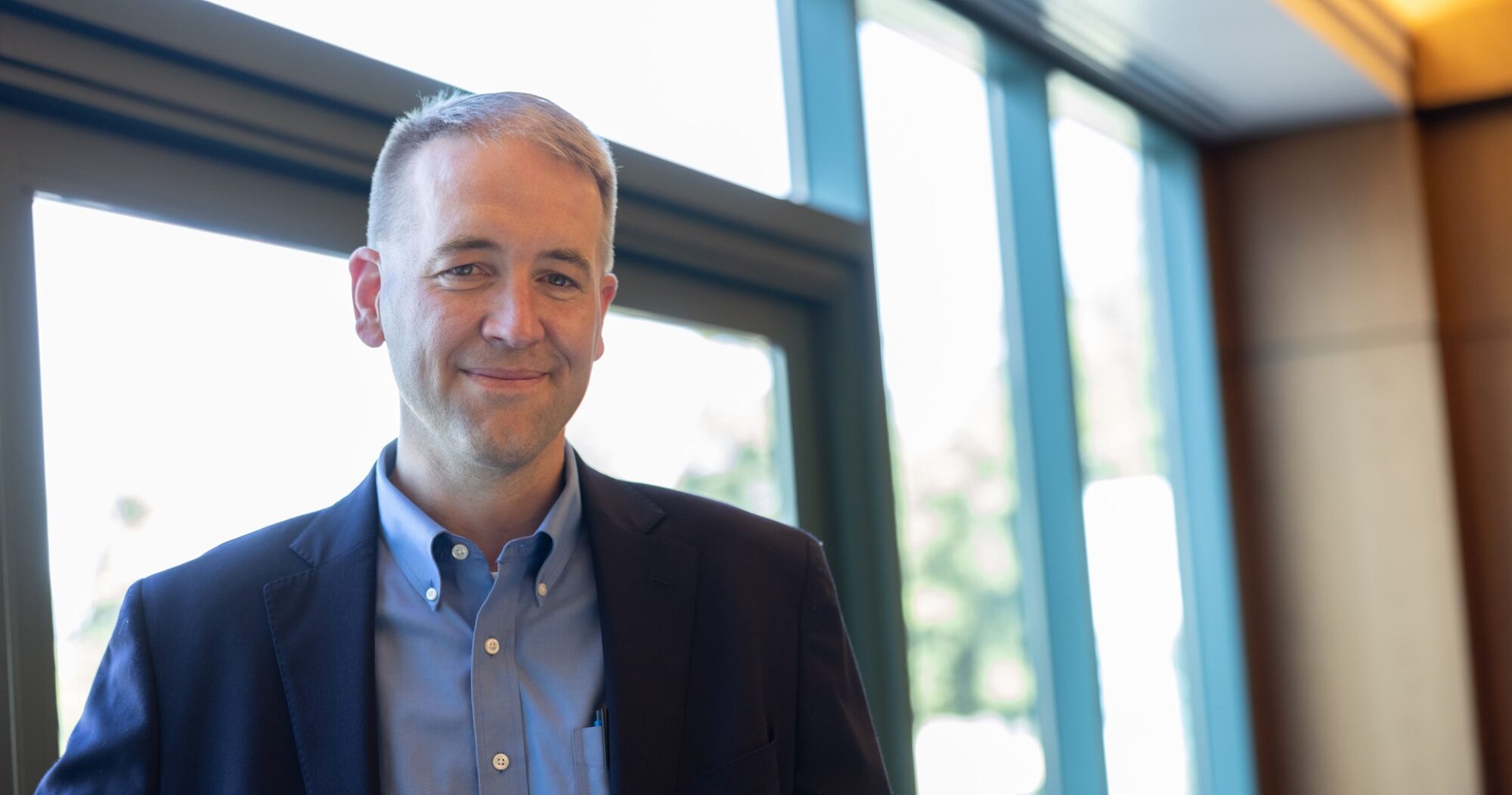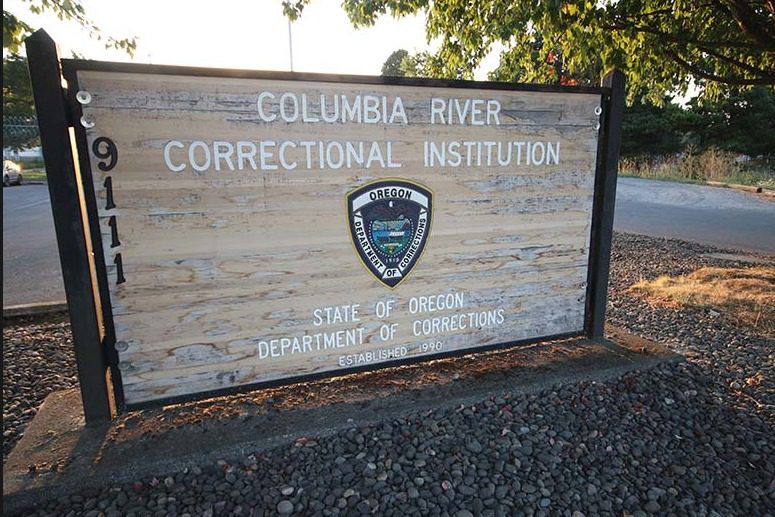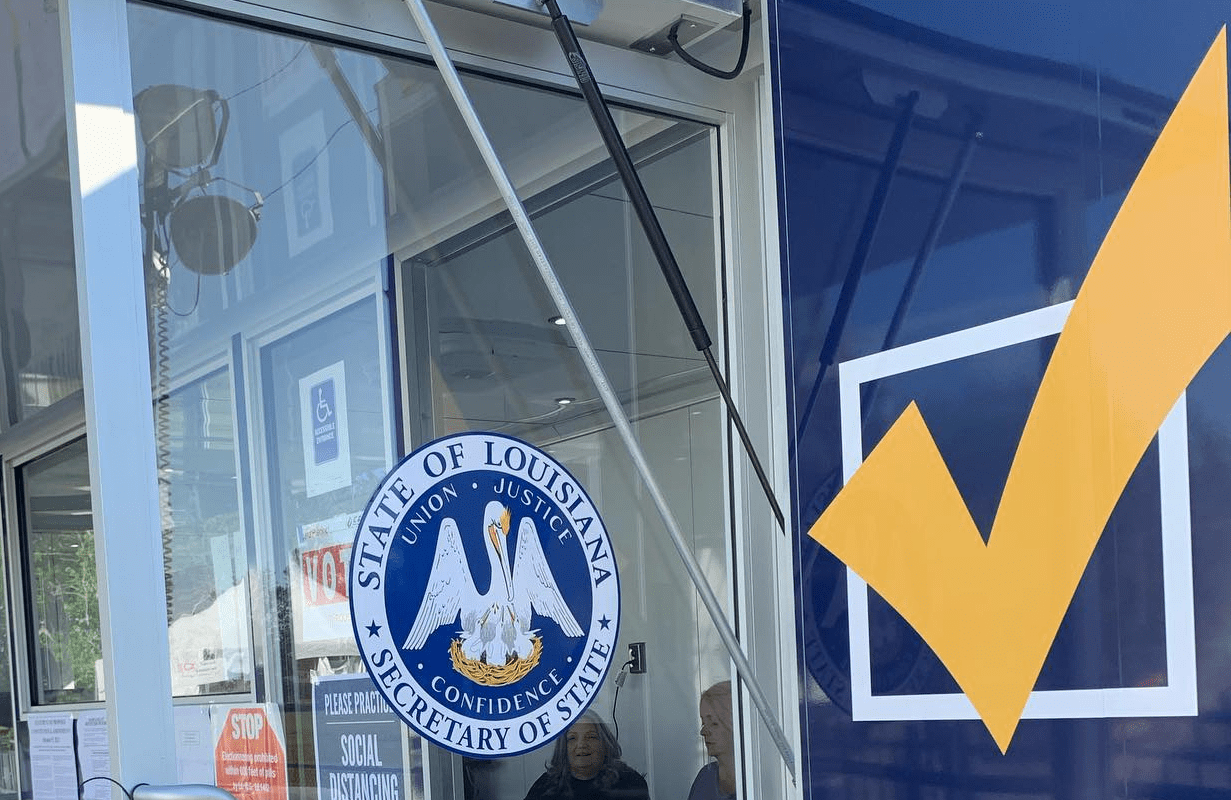In Oregon Primary, A Study In Contrasts on How to Strengthen Democracy
Oregon’s legacy of strong participation lives alongside lingering exclusions, like a ban on prison voting. Secretary of state candidates share how—and whether—they’d tackle those.
| April 26, 2024

Among the many ways Oregon has been at the vanguard of making voting easier, perhaps none is more significant than its 1998 move to universal mail voting. But in 2000, as Oregon readied to conduct the country’s first all-mail presidential election, news of that landmark reform did not reach Anthony Pickens, who at the time was held at the county jail in Portland.
“I never once saw a piece of paper, or a sign,” Pickens told Bolts. Sometimes he’d talk about the election with others detained alongside him, he said, but though adults held in Oregon jails are technically eligible to vote, “nobody else had any idea of how to get it done.”
Pickens was later convicted and transferred to the state prison system. His two-decade term there coincided with yet another major reform to election administration in Oregon: In 2015, the state kickstarted what would become a nationwide shift to automatic voter registration. But this move to make elections more inclusive again did not touch Pickens; like other Oregonians in prison over a felony, he’d lost his right to vote.
Pickens regained that right when he was released but he was dismayed to find that formerly incarcerated people he encountered rarely knew that they also could vote. In 2022, his first full year out of prison, Oregon led the country in voter turnout. It didn’t feel that way in his circles.
“The lack of education is extensive,” Pickens said. “The people who have the knowledge and the power about voting really aren’t making it as available as they could.”
Pickens’ friend Sterling Cunio, who was detained at the same prison and also let out in 2021, echoed that sentiment, telling Bolts, “When we were inside, the only way we knew that we had our rights restored once we got out is because the prisoner population was educating each other.” Young adults, people living in poverty, and Native Americans, among other groups, also experience lower turnout and less access. “Oregon can say, ‘Hey, yeah, everything is great,’ but I want to see effort to engage, to educate all underserved populations in voting,” Cunio said.
Even a state with a reputation for generally excellent voter services always has room to improve, their testimonials stressed.
That is not lost on the leading Democratic candidates to be Oregon’s next chief elections official.
James Manning, a state senator, and Tobias Read, Oregon’s treasurer and a 2022 candidate for governor, each told Bolts that they believe the state can do more to encourage participation and broaden voter access.
But they also offered different priorities and visions for what needs fixing. In his interview with Bolts, Manning emphasized the urgency of reversing the restrictions and structural neglect that keep some at the margins, including by ending the ban on people voting from prison. He talks of lingering exclusions as stains on democracy, stemming from a history of racism that Oregon should immediately confront.
Read feels the state should focus on fine-tuning the mechanics of Oregon’s existing systems before considering an idea, like voting from prison, that may be more divisive. His priorities, he said, include ironing out Oregon’s universal mail voting and automatic registration laws to address ways in which they may be tripping up the people that they’re meant to help.
Read, who has a fundraising lead and more endorsements from the state’s Democratic establishment, will face Manning in the May 21 Democratic primary. Also in the running are James Crary, Paul Damian Wells, and Dave Stauffer, candidates who have never held state-level office and have raised almost no money.
The Democratic nominee will move on to face the winner of a three-way Republican contest in November. Oregon rarely elects Republicans in statewide races, though general elections are often competitive. The victor will replace LaVonne Griffin-Valade, who came into the role last summer after Democrat Shemia Fagan resigned in scandal. Griffin-Valade is not seeking a full term.
The next secretary of state will inherit a vast bureaucracy with which to tackle stubborn participation gaps. They’ll have a significant bully pulpit from which to push for change.
They’ll also be first in line to replace the governor in the event of a vacancy. That’s how Kate Brown, who served as secretary of state from 2009 to 2015, entered the governor’s mansion in 2015; her predecessor there, John Kitzhaber, resigned—also in scandal—just a month into his fourth term.
Recalling her own work laying the foundation for automatic voter registration, a program she backed as secretary of state and then signed into law as governor, Brown told Bolts via email, “the next Secretary is going to have to be willing to take risks, innovative, and strategic.”
“What actions can the Secretary take that will create the greatest amount of good (in this case access) for the most number of folks?” added Brown, who has not endorsed in this race.
Manning says the work of strengthening democracy is something he takes “personally.” The lawmaker, who is Black, told Bolts, “Let’s go back over history. We know during Jim Crow and even before that, people that look like me had to fight for the right to vote.”
Since joining the Senate in 2016, Manning has sponsored a bevy of legislation to grow the state’s voter rolls, often tailoring bills to groups that are less likely to be registered—if not explicitly barred.
Last year, he sponsored a bill to expand the scope of the state’s automatic voter registration program. As adopted in 2015, the program applies to people who are getting or renewing a driver’s license; it left out people who don’t interact with the state’s DMV. The reform he carried, which became law last year but cannot be implemented without the federal government’s approval, would automatically register people when they interact with Medicaid offices.
State data indicate that 85 percent of eligible residents who are unregistered to vote are Medicaid recipients, meaning that they are necessarily among the poorest people in Oregon.

Manning this year unsuccessfully pushed separate legislation to implement automatic voter registration on college campuses. In 2019, he sponsored a successful effort to have Oregon cover the cost of postage on mail ballots.
He is also a rare politician who has made it a cause to give the right to vote to any citizens regardless of a criminal conviction, including while they’re incarcerated. He’s a lead sponsor of legislation to enfranchise state prisoners. In the U.S., only Maine, Puerto Rico, Vermont, and Washington, D.C., allow everyone to vote from prison, though this is more common in other countries.
“I think that every American, regardless of if they have been rehabilitated or if they are serving time, still are American citizens,” he said. “Democracy is something we should all engage in, and we have to allow people to participate.”
It’s a change Manning says can’t come soon enough: “At some point we are going to deal with the inhumanity of all of these years of what incarceration has cost us,” he said.
But the legislation on voting from prison has repeatedly fizzled at the committee stage. Some fellow Democrats have sided with Republicans to say that it goes too far, too quickly, and could cost too much money to implement.
Read, Manning’s opponent in May, is among those Democrats who believe Oregon should not at this time consider restoring voting rights to people in prison. He told Bolts that he isn’t convinced that people convicted of certain crimes deserve to vote. “Does someone who’s convicted of identity theft get treated the same as another crime? Someone who is convicted of murder? I think the nature of the crime might be part of the conversation,” he said.
In any event, Read continued, now is not the right time to have that conversation. Instead, he said, the state should focus on activating people whose rights are already restored, pointing to persistently low outreach and participation among people with past convictions; this is a widespread problem around the country, as Bolts has reported in Kentucky and Michigan.
“I think there is still quite a lot of work to do to make sure that people who are coming back into society know about their rights and are using them,” Read said. “If you’ve had your voting rights restored but didn’t know it, what difference does it make?”
Manning rejects the idea that Oregon can’t do both things at once. “I am honored to be able to bring those ideas that others may be afraid to, even though they know it’s right,” he told Bolts. “Somebody has to stand up, somebody has to be up front, and I accept that challenge.”
Manning often speaks highly of his own ability to shepherd such big changes. “I’m a visionary,” he said during a candidate debate earlier this month. “I think ahead. I see things that could be and then I implement those. I am result-oriented. There is no one like me.”
Several civil rights advocates in Oregon who support letting people vote from prison say they’ve been frustrated that the state is not prioritizing the reform.
“Constantly being told this is ‘not the right time’ is only furthering the racist undertones of how we got to this position,” said Zach Winston, who used to be incarcerated and now works at the Oregon Justice Research Center. In Oregon, as elsewhere, felony disenfranchisement is a relic of 19th-century schemes to deprive people of color of all kinds of civil rights.
Added Winston, “Oregon has never shied away from leading on voting rights, which begs the question: Why not, on this? Do they actually value people who are in prison?”
While Manning speaks in maximalist terms—he says he wants to get Oregon to at least 98 percent turnout—Read speaks the language of incremental change: “Any effort to make it easier for people to vote, to remove barriers, is a good thing,” he said. His rhetoric may be less lofty but he says he’ll pay proper attention to the weeds of a system that’s often anything but flashy.
“That grinding, diligent implementation approach really matters,” he told Bolts, “to make sure it’s done well.”
In fleshing out his priorities, Read proposed a statewide program that would send people notifications when their ballots have been accepted and again when they’ve been counted. He described this move, which some other states have already made, as a way to bolster Oregon’s existing mail voting program, ensuring that those who are using the system can trust that their votes are being counted, and take action if something seems amiss.
“The payoff may well be worth it, just because of the increased confidence people will feel,” he said.

Read also wants to advocate for a bill to give voters more time before elections to declare a party affiliation, as a way to close what he sees as a loophole in the state’s automatic voter registration system. When Oregon automatically registers people to vote, it does not assign them to any party, and so, Read worries, some voters find themselves locked out of the state’s closed party primaries by the time they want to participate.
His proposals would require action by the legislature, but Read says he’d use his standing as secretary of state to promote them.
Manning’s priorities would also demand changes in the law; matters like voting from prison cannot be unilaterally reformed by the secretary of state. He told Bolts that he has built strong relationships in the legislature that will enable him to pass his agenda. When asked about input he’s received from colleagues who oppose prison voting, though, he said, “I don’t know. I’ve not asked them. But I think it would be a good conversation.”
Neither candidate offered many specifics as to how they’d run the secretary of state’s office, and what new initiatives they want to put in place in areas that fall under its direct supervision.
Read signaled more comfort with the status quo in the office. Three former secretaries of state have endorsed him.
When asked how he would shape the office budget, and how he would distribute resources to match his priorities, Read often deferred offering details. And when asked how his office would improve communications with various groups—including formerly incarcerated Oregonians, whose engagement he said he wanted to improve before debating voting from prison—he did not mention a particular program. He repeatedly said he’d want to first consult and partner with community leaders before proposing any fixes.
Manning, too, told Bolts that he could not offer specifics on some of his plans since he is not yet the secretary of state.
While he generally expressed discontent at the pace at which the state implements voting rights measures, he didn’t identify any instances of frustration when asked to elaborate. “Until I’ve been actually in and have the opportunity to conduct sessions with the staff of the secretary of state’s office and also all of our county elections officers, only then will I be able to make a clear assessment of what it is we can fix and how fast we can get it done,” he said.
The secretary of state has discretion to innovate with programs that can reach voters in new ways and make elections smoother, stressed Brown, the former secretary of state and governor.
Brown said maximizing the position’s potential may come down to realpolitik skills. “Where do you have the votes? What are the costs and available resources?” She said she supports voting rights from prison, though she isn’t convinced that can pass. The next secretary, she said, will need to get creative and “to literally throw spaghetti at the wall to see what sticks in terms of reaching out to these important and diverse populations.”
Others experienced in Oregon’s elections system also hope that the state can keep improving, whether with ambitious projects or administrative fixes.
“There’s a general sense that Oregon has proudly been a leader in so many ways, but it is a laggard in others,” said Phil Keisling, the former Oregon secretary of state who championed vote-by-mail in the 1990s.
He fired off a slew of improvements he’d like to see. For one, he said, the state should allocate funds to cover elections costs so that local offices don’t have to scrap with their county commissions for funding. And he wants counties to set up more physical voting centers, so people don’t have to travel long distances if they want to access in-person services.
Keisling, who today advocates for mail voting nationwide as chair of the National Vote At Home Institute, has endorsed Read in this race, though he told Bolts he’ll make this case to whomever wins this year. “Oregon has often pointed to where the future needs to go, and is often a testing bed for new ideas and new approaches to enfranchise people,” he said. “I’ll be pushing whoever gets the nomination to continue that tradition.”
Others much more removed from the halls of power in Oregon say they have trouble seeing how their state can purport to lead on voting rights so long as it continues to block from voting the roughly 12,000 people held in its prisons at any one time. Black and Native American Oregonians are most disproportionately affected by that practice, a situation fueled today by the large racial disparities in the state’s criminal legal system.

“Oregon has led the way with our democratic values, but continued disenfranchisement undermines the very legitimacy of our democracy in the state,” said Mariana Garcia Medina, a policy advocate at the ACLU of Oregon. She wants Oregon to move past its “history of anti-Blackness and white supremacy,” referencing an 1857 constitutional convention that set up felony disenfranchisement and a suite of other explicitly racist restrictions on civil rights.
Pickens expects that advancing a reform as significant as prison voting rights will be difficult regardless of who wins. He says he has observed firsthand that Oregon’s reputation as an elections trendsetter belies frequent general indifference, and occasional hostility, toward the concept that every Oregonian should have a voice in democracy.
“For the working-class white American that’s been voting their entire lives, I’d point exactly that out: you’ve been doing it your entire lives. For entire generations,” Pickens said. “We were set up to be excluded.”
Sign up and stay up-to-date
Support us
Bolts is a non-profit newsroom that relies on donations, and it takes resources to produce this work. If you appreciate our value, become a monthly donor or make a contribution.




